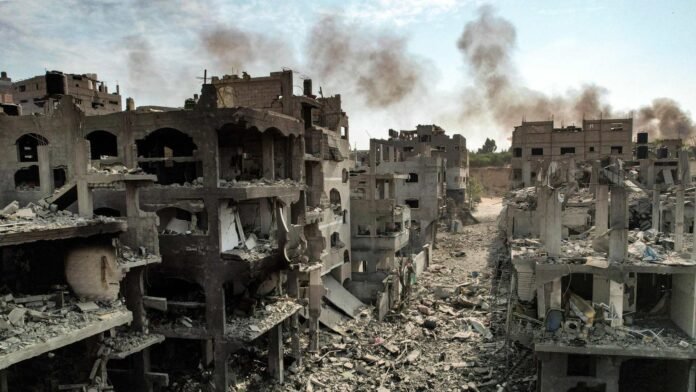Jerusalem: In the ongoing conflict between Israel and Hamas, both sides have dismissed international calls for a renewed ceasefire. On Saturday, air strikes continued to hit targets in Gaza, while Palestinian groups launched rockets in response. The sky over the northern part of Gaza was once again shrouded in smoke as combat resumed following the expiration of a temporary halt in hostilities early Friday.
According to the Hamas government in Gaza, 240 people have lost their lives since the ceasefire ended. In Israel, the military’s Home Front Command reported 40 missile alerts in the southern and central regions of the country. Additionally, Palestinian groups, including Hamas and Islamic Jihad, announced launching “rocket barrages” targeting three Israeli municipalities near Gaza. The situation remains tense, with both sides engaging in military actions despite international calls for restraint.
The situation in Gaza remains dire, with an estimated 1.7 million people, roughly 80% of the population, displaced due to the eight weeks of ongoing conflict, according to the United Nations. The Al-Ahli Arab Hospital in Gaza City has reported receiving 30 bodies, including seven children, since the morning. Residents like Nemr al-Bel, 43, have witnessed the destruction of homes, with three houses bombed and 10 fatalities in his family alone, along with 13 individuals still trapped under the rubble.
The humanitarian crisis is escalating, with shortages of food, water, and essential supplies, compounded by the destruction of many homes. Despite the declaration of a humanitarian catastrophe by UN agencies, aid has faced challenges in reaching those in need. Following the expiration of the truce between Israel and Hamas, there were initial restrictions on aid convoys crossing the Rafah border from Egypt. However, some aid trucks managed to arrive on Saturday, providing much-needed relief.
The breakdown of the truce has led to renewed hostilities, with both sides blaming each other. The truce, brokered with the assistance of Qatar and backed by Egypt and the United States, had facilitated the release of 80 Israeli hostages in exchange for 240 Palestinian prisoners. However, on Saturday, Israel announced the withdrawal of its negotiators from Doha, citing a deadlock in talks aimed at securing a renewed pause in hostilities. The situation remains tense and complex, with ongoing efforts to address the humanitarian crisis and negotiate a sustainable resolution.
“Following a deadlock in negotiations and under the direction of Prime Minister Benjamin Netanyahu, Mossad chief David Barnea ordered his team in Doha to return to Israel,” announced the Israeli leader’s office.
French President Emmanuel Macron has called for intensified efforts to secure a lasting ceasefire, ensuring the release of all hostages, increased aid access, and the assurance of Israel’s security.
During an unprecedented attack on October 7, Hamas fighters breached Gaza’s militarized border with Israel, resulting in approximately 1,200 casualties, predominantly civilians, and the taking of around 240 Israelis and foreigners as hostages, as reported by Israeli authorities. Israel pledged to eliminate Hamas in response, launching an air and ground campaign that claimed over 15,000 lives, mainly civilians, according to Hamas authorities in Gaza.
Since the expiration of the truce, Israel’s military forces have targeted over 400 locations in Gaza, consistent with the daily average strikes before the pause. On Saturday, warplanes conducted an extensive attack in the Khan Yunis area of Gaza’s south, hitting more than 50 targets. Additionally, an Israeli armored brigade eliminated terrorist squads and directed fire against targets in the north of the Gaza Strip.
In response, Hamas fired rockets from Gaza towards Israel after the truce lapsed. The return to hostilities has been widely condemned by international leaders and humanitarian groups.
